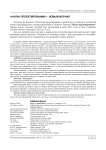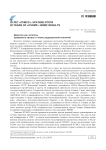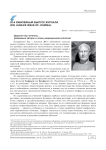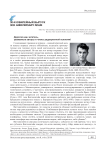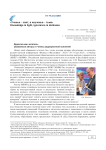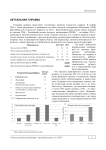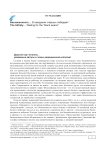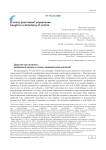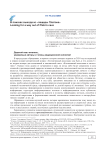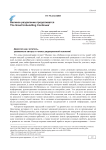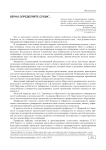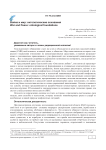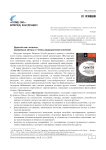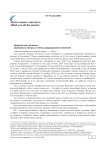От редакции. Рубрика в журнале - Онтология проектирования
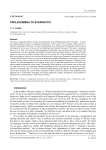
Статья научная
The article expounds prefatory remarks and explanatory essay (Prolegomena) to the Evergetics - a value-and subject-oriented science on management processes in the society. The Evergetics seeks reserves to improve management efficiency not in the modernization of an “impersonal” bureaucratic machine, but in the people, in every man, in the use of his intellectual and volitional resources. The man is considered there not as a “cog” of a value-invariant management mechanism, but as a person (actor), endowed with consciousness, who acts rationally and performs cognitive-activity-related functions together with other people to resolve any problem situations that arise in everyday life. These heterogeneous actors having their own subjective views of the world and value priorities, based on the Poincaré's conventional concept of truth, which treats the truth as a result of an agreement, produce intersubjective knowledge, on the basis of which they make a collective decision on how to settle the situation. Perception of meaning of the situation by each heterogeneous actor happens at the level of individual consciousness. However, one person cannot constitute the whole variety of meanings of the situation, so this person receives from others what lacks in his own experience. Meaning-generating activity of people has an impact on all intersubjective community and, as a result, a common meaning-bearing space appears. A holonic approach is used in the Evergetics (on a “part-whole” principle) to build systems in contrast to the traditional causal approach (on a “cause-effect” principle). The article emphasizes strategic significance of the problem to transform the “Economic Man” to the “Man of Culture”.
Бесплатно
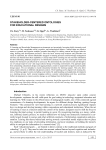
Stakeholder-centered ontologies for educational designs
Статья научная
E-Learning and Knowledge Management environments are increasingly becoming highly interactive and content-rich. They encapsulate social, cognitive, and technological aspects. Concept maps are effective means to generate and organize multiple grounded knowledge for sharing content and trigger behavior along learning and development processes. Since the basic concept map structure and procedure can easily be explained, the various stakeholders engaged in learning processes and knowledge management activities can benefit from these capabilities. Concept maps allow encoding not only relevant information but also elaborating different perspectives on information elements. In this way, meaningful content and features for interaction can effectively be conveyed. We demonstrate the non-intrusive and non-disruptive use of concept maps for user- and usage-centered design of learning environments. The approach spans from articulating educational designs and tagging didactic content to purposeful navigation and traceable design spaces. We use metadata to encode educational intention for learning support. They also allow using content elements in different educational contexts. Their handling can be aligned with existing features of learning support systems including social media. By understanding such application development as a learning process itself, concept mapping enforces systemic understanding and thus, accelerates further developments in context-sensitive design, as our findings from the field reveal.
Бесплатно
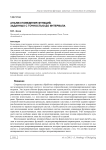
Анализ поведения функций, заданных с точностью до интервала
Статья научная
Рассмотрены существующие подходы к расчёту, анализу, синтезу и оптимизации систем в условиях неопределённости. Сформулирована и подробно описана задача вычисления и анализа поведения неполностью определённой функции, заданной с точностью до интервала возможных значений. Для решения этой задачи предложен алгоритм детерминизации, который позволяет свести задачу к двум аналогичным - для верхней и нижней граничных функций исходной неполностью определённой функции. В этом алгоритме используется аппарат интервальной математики и интервально-дифференциального исчисления. Выделены различные типы возможного поведения интервальных функций (постоянство, возрастание, убывание, расширение, сужение) и различные типы экстремальных точек этих функций (точка максимума, точка минимума, точка максимального расширения, точка минимального расширения). Доказаны теоремы, позволяющие выделять участки различного поведения интервальных функций и точки с различными видами их экстремума. Подробно описана работа предложенного алгоритма детерминизации, позволяющего анализировать поведение интервальных функций. Эта работа проиллюстрирована на конкретном примере.
Бесплатно
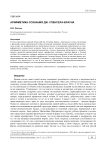
Арифметика сознания Дж. Спенсера-Брауна
Статья научная
В статье представлен краткий обзор идей Дж. Спенсера-Брауна - британского логика, математика и философа, автора оригинальной теории исчисления индикаций, предоставляющей математическую основу для воображаемой или двойственной логики, учитывающей двойственность и самореферентность человеческого познания. Также в связи с изложением идей Спенсера-Брауна рассматриваются вопросы соотношения математики и логики, проявления наблюдаемого и ненаблюдаемого, проведён сравнительный анализ «арифметики сознания» Спенсера-Брауна и булевой алгебры. На конкретных примерах показана онтологическая асимметрия логики Аристотеля и её преодоление с помощью алгебры и арифметики Спенсера-Брауна. Исходя из законов формы, продемонстрированы два класса явлений, и связанных с ними понятий, соответствующих ответам на вопросы: «что происходит»? и «что за этим кроется»? Показана роль исчисления индикаций, как математического аппарата для моделирования когнитивных процессов.
Бесплатно

